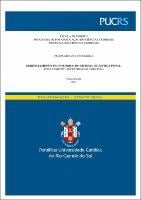| Share record |


|
Please use this identifier to cite or link to this item:
https://tede2.pucrs.br/tede2/handle/tede/10243| Document type: | Dissertação |
| Title: | Gerenciamento tecnológico do sistema de justiça penal : policiamento, investigação e decisão |
| Author: | Giacomolli, Felipe Mrack  |
| Advisor: | Gloeckner, Ricardo Jacobsen |
| Abstract (native): | Esta dissertação versa sobre a complexa intersecção entre as novas tecnologias e o sistema de Justiça Criminal, inserindo-se na área de concentração Sistema Penal e Violência, com ênfase na linha de pesquisa Sistemas Jurídico-Penais Contemporâneos, do Programa de Pós-Graduação em Ciências Criminais da PUCRS. Debruça-se sobre as implicações decorrentes da utilização de ferramentas tecnológicas baseadas em Inteligência Artificial no sistema punitivo e os principais riscos e perspectivas da incorporação de soluções tecnológicas no sistema de Justiça Criminal. Nesse contexto, o presente trabalho examina e questiona os discursos e lógicas por trás da inserção dessas ferramentas no sistema de Justiça Criminal, mediante pesquisa de cunho epistemológico, teórico e filosófico. O primeiro capítulo perpassa o panorama sociotécnico da tecnologia, estabelecendo uma compreensão básica sobre as principais tecnologias presentes no século XXI, desmistificando as falácias de neutralidade e objetividade. Nesse capítulo, também é analisado o fenômeno da governamentalidade algorítmica e o movimento do atuarialismo, que se instrumentaliza em ferramentas de prognóstico de risco reorientando a atividade estatal sobre os códigos epistêmicos da eficiência e do gerencialismo. O segundo capítulo trabalha a adaptação do Poder Judiciário ao intenso desenvolvimento tecnológico, fruto da sociedade digital e informacional, que tem início com a mera informatização de documentos e procedimentos, alcançando, progressivamente, camadas mais profundas do sistema de Justiça. Delineado esse cenário, ainda no segundo capítulo, a pesquisa analisa o quadro regulatório sobre o uso da Inteligência Artificial nos Tribunais, destinado à construção de diretrizes e balizas ético-jurídicas ao desenvolvimento e uso dessas ferramentas pelos Poderes Públicos. Por fim, o terceiro capítulo combina as premissas estabelecidas no primeiro, sobre o panorama sociotécnico da tecnologia, com o avanço no sistema Judiciário e o panorama ético-jurídico abordados no segundo, examinando criticamente como o big data, os algoritmos e o fenômeno da Inteligência Artificial interagem e se integram à Justiça penal, impactando o processo penal e as práticas de diversos atores judiciais desde a fase investigatória até a atividade decisória. Ao final, delineados alguns dos principais dilemas e riscos desvelados nessa intersecção entre ciências criminais e novas tecnologias, realizam-se reflexões sobre as perspectivas de utilização de ferramentas tecnológicas com foco em princípios ético-jurídicos voltados a potencializar a dignidade humana e o papel central do ser humano. |
| Abstract (english): | The research is about the complex intersection between new technologies and the criminal justice system, being inserted in the area of concentration Criminal System and Violence, emphasized on the research line Contemporary Legal-Criminal Systems from Postgraduate Program in Criminal Sciences at PUCRS. This work focuses on the implications arising from the use of technological tools based on Artificial Intelligence in the punitive system and the main risks and perspectives of the incorporation of technological solutions in the criminal justice system. In this context, the research examines and inquires the discourses and logics behind the insertion of these tools in the criminal justice system, through epistemological, theoretical, and philosophical research. The first chapter goes through the socio-technical panorama of technology, establishing a basic understanding of the main technologies present in the 21st century, demystifying the fallacies of neutrality and objectivity. This chapter also analyzes the algorithmic governmentality phenomenon and the actuarialism movement, which is instrumentalized in risk assessment tools, reorienting the state activity over the epistemic codes of efficiency and managerialism. The second chapter deals with the Judiciary adaptation to the intense technological development, as a result of the digital and informational society, which begins with the mere documents and procedures informatization, reaching, progressively, deeper layers of the justice system. After outlining this scenario, in the second chapter, the research analyzes the regulatory framework on the use of Artificial Intelligence in Courts, intended for the construction of ethical-legal guidelines for the development and use of these tools by the state. Finally, the third chapter combines the premises established in the first about the socio-technical panorama of technology with the progress in the judicial system and the ethical-legal panorama addressed in the second, critically examining how big data, algorithms, and the phenomenon of Artificial Intelligence interact and integrate into criminal justice, impacting the criminal procedure and the various judicial actors practices from the investigative phase to the decision-making process. At the end, after delineating some of the main dilemmas and risks unveiled in the intersection between criminal sciences and new technologies, reflections are made on the perspectives of using technological tools focused on ethical-legal principles aimed at enhancing human dignity and the human being central role. |
| Keywords: | Novas Tecnologias Lógica Atuarial Virada Tecnológica no Direito Sistema de Justiça Criminal |
| CNPQ Knowledge Areas: | CIENCIAS SOCIAIS APLICADAS::DIREITO |
| Language: | por |
| Country: | Brasil |
| Publisher: | Pontifícia Universidade Católica do Rio Grande do Sul |
| Institution Acronym: | PUCRS |
| Department: | Escola de Direito |
| Program: | Programa de Pós-Graduação em Ciências Criminais |
| Access type: | Acesso Aberto |
| Fulltext access restriction: | Trabalho será publicado como artigo ou livro |
| Time to release fulltext: | 36 meses |
| Date to release fulltext: | 24/05/2025 |
| URI: | https://tede2.pucrs.br/tede2/handle/tede/10243 |
| Issue Date: | 16-Dec-2021 |
| Appears in Collections: | Programa de Pós-Graduação em Ciências Criminais |
Files in This Item:
| File | Description | Size | Format | |
|---|---|---|---|---|
| DIS_FELIPE_MRACK_GIACOMOLLI_COMPLETO.pdf | FELIPE_MRACK_GIACOMOLLI_DIS | 1.7 MB | Adobe PDF |  Download/Open Preview |
Items in DSpace are protected by copyright, with all rights reserved, unless otherwise indicated.




